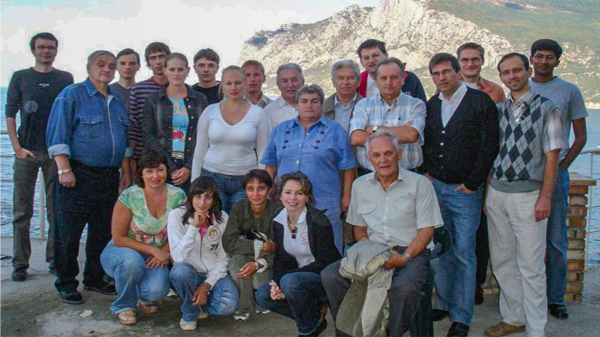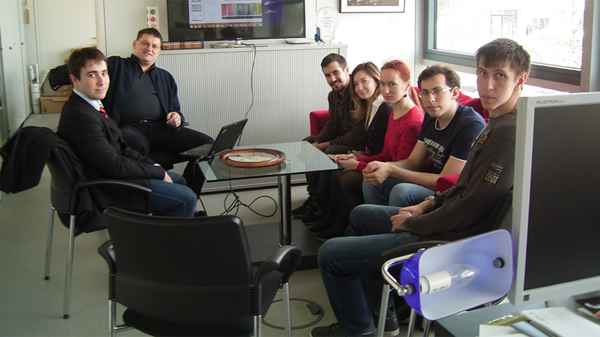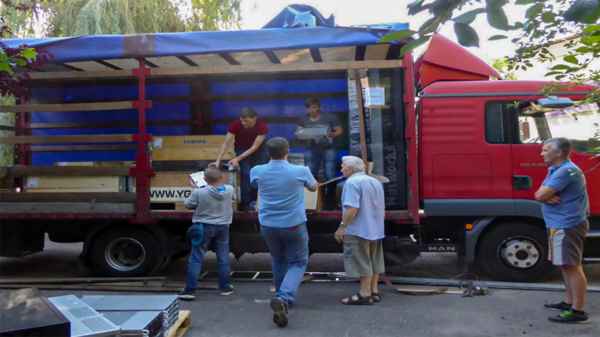High-Performance Computing Center Stuttgart

The cooperation in teaching and research that has been established over decades is proving its worth. On the occasion of the anniversary, Rector Prof. Wolfram Ressel points out: "The many years of cooperation with DonNTU is a unique partnership among scientists from the fields of high-performance computing and simulation science that is based on trust and accompanied by friendships. Russia’s ongoing war in Ukraine has brought the universities in Stuttgart and Donetsk even closer together and has strengthened the cooperation. We want to hold on to this!"
The transnational networking was initiated by Volodymyr Svjatnyj, Professor of Simulation Science, Head of the Department of Computer Engineering at DonNTU and, since 2013, a recipient of the Medal of Honor of the University of Stuttgart. In 2022, Prof. Svjatnyj fled to Germany. At the invitation of Prof. Michael Resch, Head of the Institute of High Performance Computing (IHR) and Director of the High-Performance Computing Center Stuttgart, he is currently working as a visiting scientist at the University of Stuttgart.
Michael Resch says: "We are proud that the partnership between the scientific communities in Stuttgart and Donetsk has endured over the years and continues to be strong despite crises and changing political situations. Science benefits immeasurably from trusting, international cooperation, and our partnership with DonNTU has greatly benefited the research in both Germany and Ukraine. In view of the ongoing war, it is very important to us that we continue this cooperation."
Volodymyr Svjatnyj, who was born in 1937, is looking back to the beginning of the partnership: “It was an interesting era back then, after Leonid Brezhnev and Willy Brandt had agreed to cooperate in various areas,” remembers Prof. Svjatnyj. Back then, a ten-month scholarship from the German Research Foundation (DFG) enabled him to stay at the Institute for System Dynamics and Control Engineering (ISR, today the Institute for System Dynamics) at the University of Stuttgart. There, Svjatnyj and ISR Director Prof. Ernst-Dieter Gilles, who was two years his senior, jointly researched hybrid computer systems. "Sometimes the right people meet at the right place," Svjatnyj sums up the birth of the university cooperation that continues to this day.

Svjatnyj’s research, which focused on parallel simulation technology, served the mining and coal industry in the Donbas region of eastern Ukraine. Also, the researcher had the opportunity to hone his German-language skills, since he had learned German in school and then, in Stuttgart in the 1970s, worked and lived together with young people from various countries.
In 1989, Prof. Andreas Reuter, Founding Director of the Institute for Parallel and Distributed High-Performance Computers at the University of Stuttgart, visited the Soviet Union. The networks were further expanded and in 1990, Prof. Reuter invited delegations from the Soviet Union, the GDR, and the Federal Republic of Germany to a computer science conference in Stuttgart.
In 1991, the Ministry of Higher Education in Moscow officially allowed Svjatnyj to establish contact with other higher education institutions. He immediately contacted the professors Gilles, Reuter, and Rudolf Lauber, Head of the Institute of Industrial Automation and Software Engineering (IAS), and went on a flight to Stuttgart – "with the first plane that left Moscow after the coup d’état in August." The four professors agreed on a direct cooperation between their institutes, which in the following years facilitated student study visits as well as joint research work, publications, and courses. In 1992, Svjatnyj followed the example of the respective study program in Stuttgart and initiated a German-language Computer Engineering study program. Also in 1992, he established “ParSimTech,” a research and training center for parallel simulation technology.

In the year 2000, a cooperation agreement on joint activities in research and teaching was signed. Since then, numerous reciprocal visits have followed, and a joint conference was held in 2013. To this day, 102 scholarship holders from Ukraine have received an on-site scholarship in Donetsk as well as a short-term scholarship at the University of Stuttgart within the framework of the Leonhard Euler Scholarship Program of the German Academic Exchange Service (DAAD). Until 2014, the Chair of Computer Technology, the Chair of Applied Mathematics and Computer Science as well as, to some extent, the Chair of Geodesy at DonNTU were involved in the cooperation with the University of Stuttgart. After the war began in eastern Ukraine in 2014, the university institutions administered by the separatists remained at the old location, while most of the DonNTU employees moved to the small town of Pokrowsk, where, with the support of the government of Ukraine and external funding, they were able to build a new infrastructure and maintain almost all of the courses offered.
In 2022, the university had to flee Pokrowsk, too, and is currently located in Lutsk in western Ukraine. The employees were only able to take some of the equipment with them, while the teaching staff and the students are scattered across Ukraine and various other countries. Courses are mainly held online.
“In the spring of 2022, we received a large amount of assistance,” says Elena von Klitzing, Head of the Welcome Campus for Refugees at the International Office of the University of Stuttgart. Through personal support for the Ukrainian colleagues, by accepting researchers who fled Ukraine, and, in particular, within the framework of the DAAD program “Ukraine digital”, the University of Stuttgart has been helping DonNTU maintain its teaching activities since 2022. “We support members of the DonNTU teaching staff who fled Ukraine, so that they can continue their teaching activities. We also help Ukrainian students who are in financial distress.”

In 2022, for example, researchers from Ukraine had the opportunity to continue their work at institutions and laboratories in Stuttgart for one month and make use of digital services that were developed during the pandemic. Institutes and institutions involved include: the Institute for Sanitary Engineering, Water Quality and Solid Waste Management (ISWA), the Institute for Systems Theory and Automatic Control (IST), the Institute for High-Performance Computing (IHR), the Institute of Educational Science (IfE), the Institute of Literary Studies, the Institute of Business Administration, and the Language Center. "In order to be able to continue teaching, it is necessary to explore all the possibilities of online teaching and to follow suggestions and best practice examples. However, these suggestions are no one-way street. It means that we as lecturers of the University of Stuttgart can also learn from the experiences of our Ukrainian colleagues in the field of online teaching," says Martina Widon, who is an academic staff member at the Language Center.
"Compared with the spring of 2022, the situation is currently more stable and, despite the absence of teaching staff, DonNTU has managed to maintain the courses offered. This is very remarkable,” says von Klitzing. "But something can happen any day, there could be an attack on the infrastructure and the situation would be dramatic again." According to von Klitzing, the aim now is to turn the emergency aid provided so far into further projects. However, she thinks that a long-term perspective is difficult. "Besides the cooperation based on personal contacts, we are dependent on DAAD funding." This also applies to other funding lines, with which the International Office has already been able to support a large number of students and prospective students who fled Ukraine, she says.
"It is very important for us that we work at a university level even in these difficult times, that we teach and do research," the Ukrainian Volodymyr Svjatnyj points out. "In the process, the solidarity of our German colleagues is very important to us and helps young people, in particular, to continue their education."
This article is republished with permission from the University of Stuttgart.